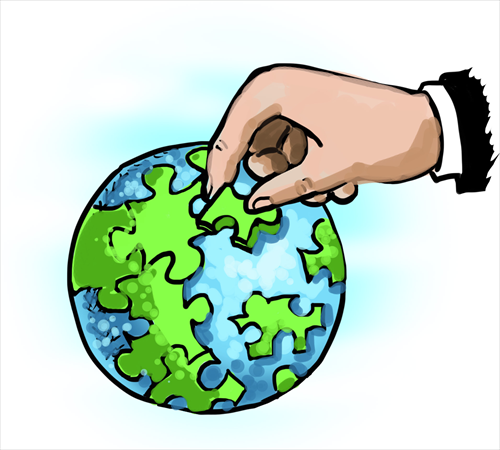Ukraine crisis opens new era of confrontation

Illustration: Liu Rui/GT
The icy wind of tension has lingered strongly over Ukraine for over a year. It is more than a national crisis, instead, it has become a major contributor to the post-Cold War global political and economic environment.
Relations between Russia and the West have reached a new low, with speculators labeling the confrontation a "new Cold War." The turmoil, which changed not only the fate of Ukraine, but also the European geopolitical environment, has revealed the weak points of the international political order in post-Cold War era.
It has been more than 20 years since Ukraine declared its independence and chose the path of Western democratic systems as well as a free-market economy. However, the results turned out to be disappointing. Although the nation realized the separation of powers and a direct electoral system, the ensuing power struggle among president, government and parliament was bitter, and caused successive corruption scandals and street revolutions.
The Western political system did not bring the country clean and efficient administration, nor did the market economy and privatization bring economic modernization. Thus, due to a lack of combination between the democratic system, market economy and its own national conditions, the Ukraine crisis has grown into a full-blown disaster due to the bloody conflict amid a political and economic transformation.
Ukraine followed a similar path of privatization of Russia. However, unlike Russia, which gained control over economic development by cracking down on the oligarchs, an increasing number of oligarchs and corruption sucked up most of Ukraine's wealth, after the nation transferred state-owned assets into private hands.
Moreover, 20 years since the end of the Cold War, the Western countries have not been able to recognize Russia's strategic importance in building the European security system. Instead, all they have tried to do is force Russia to submit and concede to the Western powers. The Western coalition, led by the US, has neither planed to embrace Russia, nor intended to set a frontier for its own expansion.
The outbreak of the Ukraine crisis led to a crisis of European geopolitical security. When Russia conducted large-scale military exercises on the doorstep of the central European countries, the NATO security treaty proved to be weak and insufficient.
The regime change in Ukraine has also pushed Russia into a disadvantaged position in geopolitical terms, for Ukraine is not only a buffer zone for Russia's geopolitical security, but also the cradle of Slavic civilization.
In this regard, the Ukraine crisis has broken the postwar international order of cooperation and dialogue, and brought back military confrontation.
Admittedly, the crisis in Ukraine is a watershed moment for the postwar relationship between Russia and the West, and Russia and the US have turned from tolerance to antagonism.
As for Ukraine, it announced that it would abandon its non-aligned foreign policy recently. And it has been trying to go further Westward economically, politically, and for security reasons. But as the complexity of Ukraine crisis remains, the conflict in Ukraine as well as the standoff between Russia and the Western countries will take years to resolve.
Since the end of the Cold War, the international political pattern has changed as emerging economies have become increasingly influential. The tendency and pressure to reform the world order have become more and more obvious, especially after the 2008 world economic crisis. Yet the traditional superpowers still cling onto the existing order and obstinately believe that the Western values and the old international order are unbreakable.
But the outbreak and the development of the Ukraine crisis are a game between the old forces of global political order and the rising powers, which shows that an improved and a fair order is needed in the constantly changing world.
Holding on to the old establishment will only lead to an unbalanced world order, while working together to build a new order is the real solution for the current international conflicts and future world crisis.
The author is an associate research fellow at the Institute of Russian, Eastern European & Central Asian Studies of the Chinese Academy of Social Sciences. opinion@globaltimes.com.cn